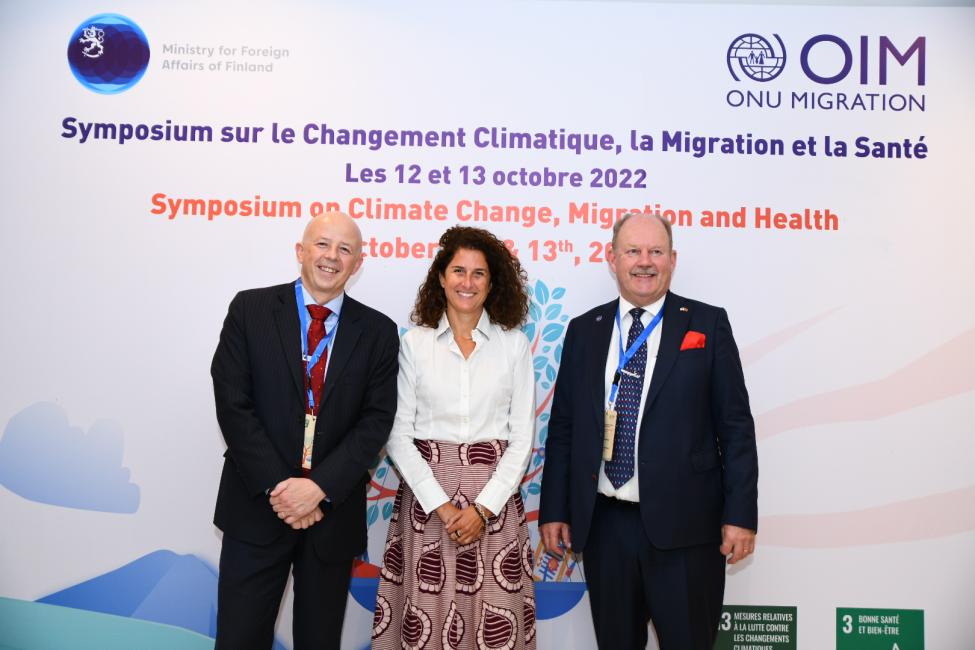-
Who we are
WHO WE AREIOM is the leading inter-governmental organization promoting humane and orderly migration for the benefit of all, with presence in over 100 countries. IOM has been active in the Middle East and North Africa from the early 1980s.
About
About
IOM Global
IOM Global
-
Our Work
Our WorkAs the leading inter-governmental organization promoting since 1951 humane and orderly migration, IOM plays a key role to support the achievement of the 2030 Agenda through different areas of intervention that connect both humanitarian assistance and sustainable development. Across the Middle East and North Africa region, IOM supports States in realizing their national priorities and in fulfilling their international commitments in the areas of migration, displacement and mobility.
Cross-cutting (Global)
Cross-cutting (Global)
- Where we work
- Take Action
- Data and Resources
- 2030 Agenda
IOM Morocco Organizes Symposium on Climate Change, Migration and Health Ahead of COP27
13 October 2022 – Marrakesh, Morocco. Ahead of COP27, which sets to take place in Egypt in November 2022, the International organization for Migration (IOM) in Morocco, in coordination with the Ministry of Energy Transition and Sustainable Development, the Ministry of Health and Social Protection and the Department of Moroccans Living Abroad, has organized a symposium on climate change, migration and health.
The symposium -, which took place in Marrakesh 12–13 October 2022 and attended by senior Government Representatives, partners, Member states’ Ambassadors, civil society, academics, donors and UN officials including Acting UN Resident Coordinator M. François Reybet-Degat - came within the framework of the regional project “Promoting the health and protection of migrants in vulnerable situations in Morocco, Tunisia, Libya, Egypt, Sudan and Yemen” funded by the Finnish Ministry of Foreign Affairs.
“This symposium intended to discuss the interconnection between climate change and migration and health issues, which have a considerable humanitarian impact on local communities. And, above all, on the mobility of vulnerable populations, particularly in the MENA region.” Said Mrs Laura Palatini, IOM Morocco Chief of Mission. “Climate change has real and devastating health consequences which are drastic and often deadly. IOM and its key stakeholders aim behind organizing this symposium to explore opportunities to strengthen future policies and programs on migration, health and climate change.”
In this regard, IOM Morocco continues to be actively engaged on the issues of causality and impacts of climate change on mobility, especially for the vulnerable populations. As part of this, IOM Morocco has launched a pilot project, funded by the IOM Development Fund (IDF), to support its key partners to mainstream migration within environmental and climate change policies.
“As far as the United Nations System in Morocco is concerned, we are committed to support our national partners on the three thematics of this symposium, by participating in the reflection and exchanges. This is mainly ensured through the "Migration & Asylum" thematic group, whose main objective is to ensure the coordination between national and international interventions on migration and asylum issues, including those dealing with health and climate change" outlined the Acting UN Resident Coordinator in Morocco M. François Reybet-Degat..
This symposium, which is aligned with Goal 13 of the 2030 Agenda for Sustainable Development and Goal 2 of the Global Compact for Safe, Orderly and Regular Migration, explored the links between climate change, migration and health in the Middle East and North Africa (MENA) region with a particular focus on women’s health.
The choice of Marrakech city has a symbolic significance – it is where the United Nations and its main stakeholders had gathered in 2018 for the adoption of the Global Compact agreement for safe, orderly and regular migration.
The symposium concluded with several recommendations to better enhance coordination, policy and research on matters related migration and mobility. This includes IOM calling on partners and key stakeholders to enhance research mechanisms and links between climate change, migration and health in order to inform relevant policies by consolidating emerging good practice and evidence. Also, to strengthen the record of national, regional and international health policies that promote the use of health services by migrants. And, to improve existing international, regional and national partnerships.
For more information, please contact IOM Regional Spokesperson, Mohammedali Abunajela mmabunajela@iom.int or Myriam MASSAIA, Senior Communication Assistant, IOM Marocco, mmassaia@iom.int
